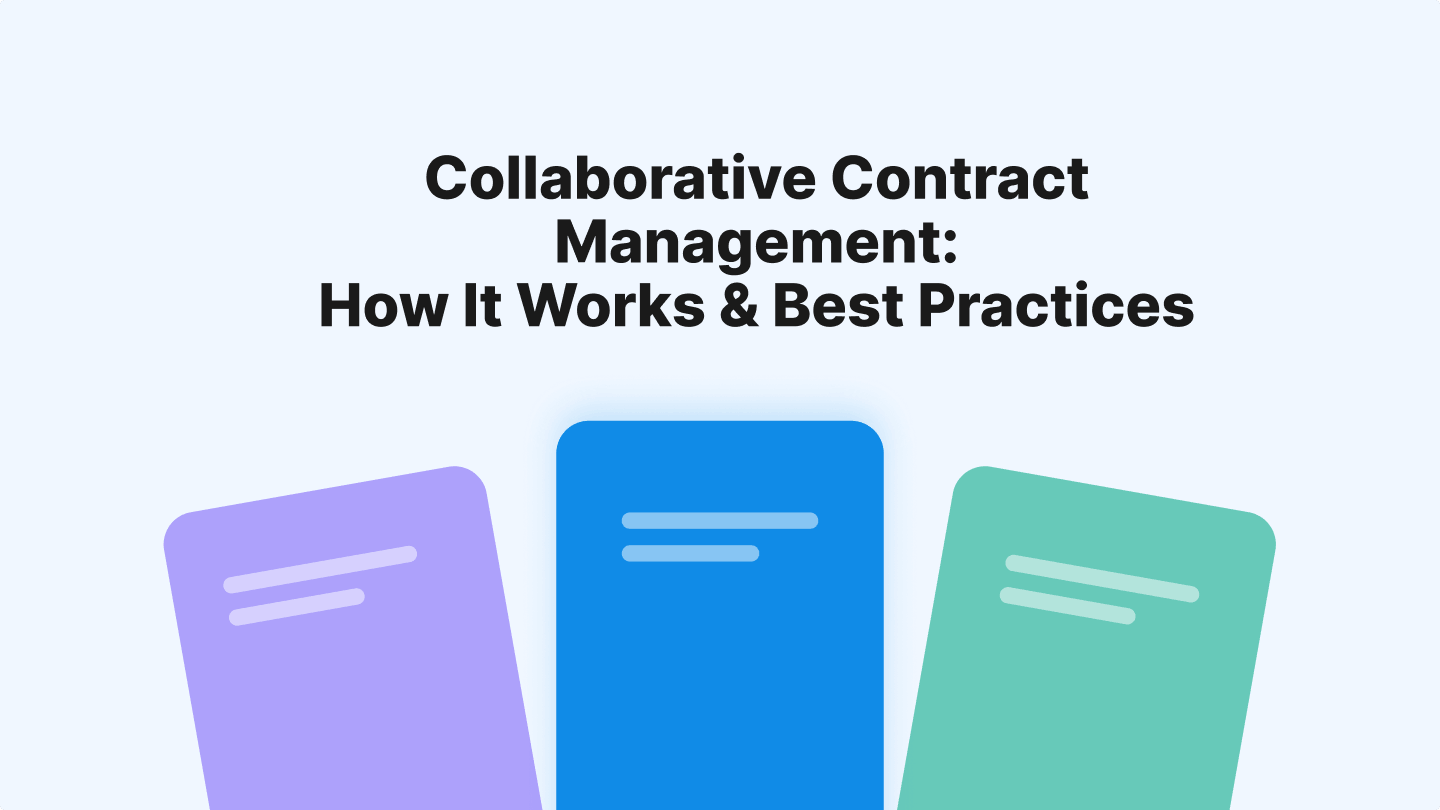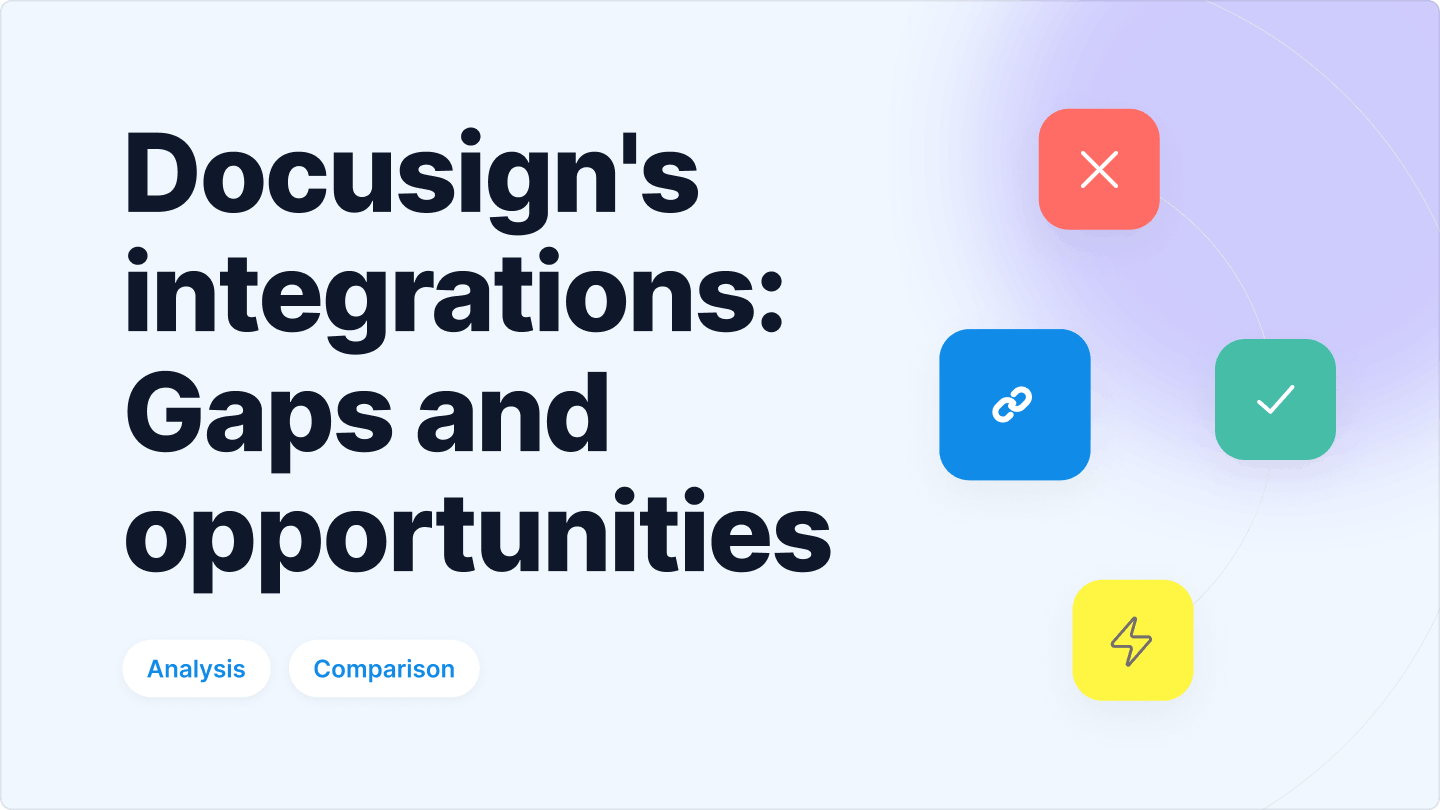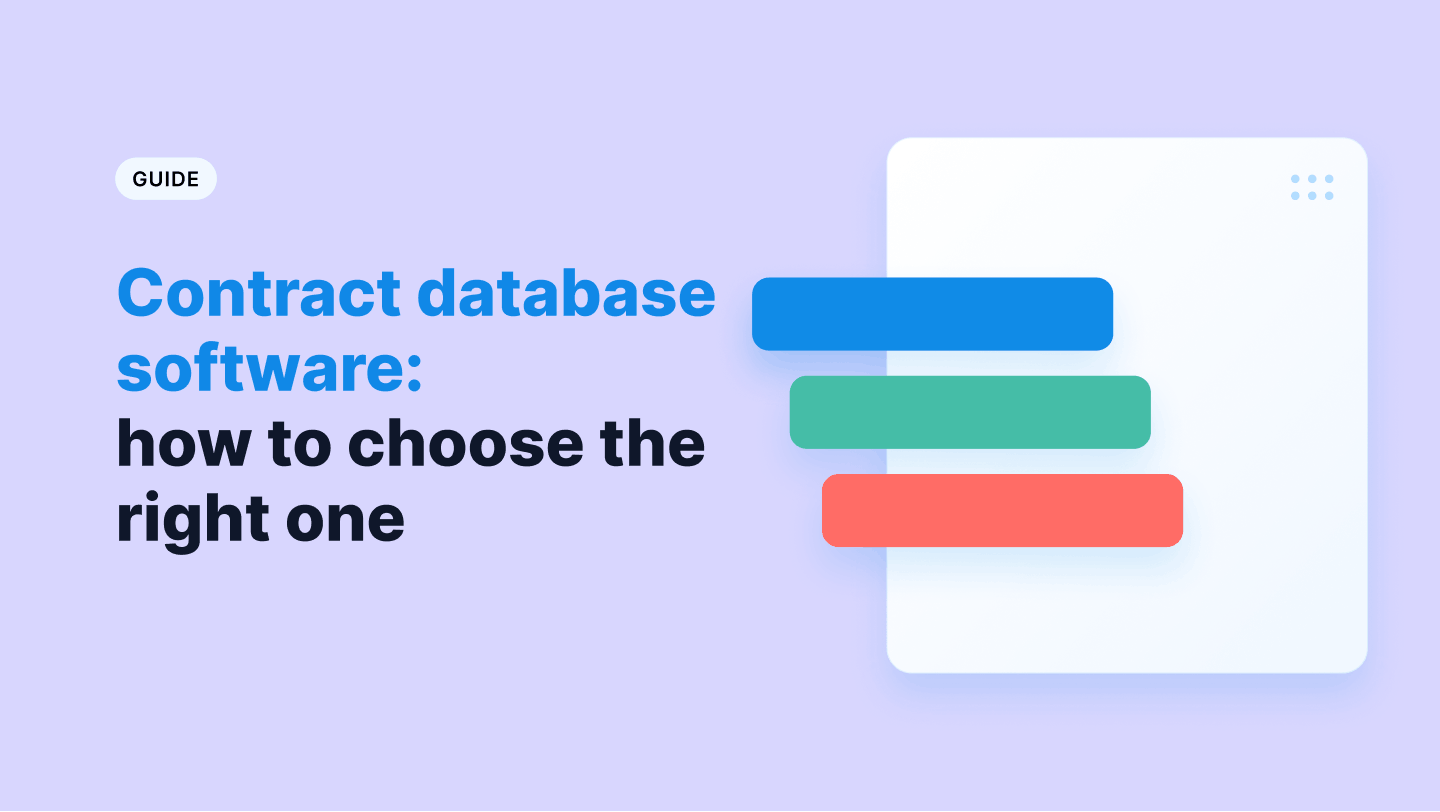If you’ve been researching contract management platforms, chances are Concord has popped up more than once and for good reason. It packs a lot into one tool: drafting, editing, negotiating, signing, and tracking contracts. Many users call out how easy it is to learn, with an interface that feels familiar right away.
But here’s where the story shifts. The same reviews that praise Concord’s simplicity also surface recurring frustrations. Some users mention clunky editing tools that slow them down, others get stuck with awkward signing workflows that feel rigid, and more than a few wish for better mobile support and smarter automation.
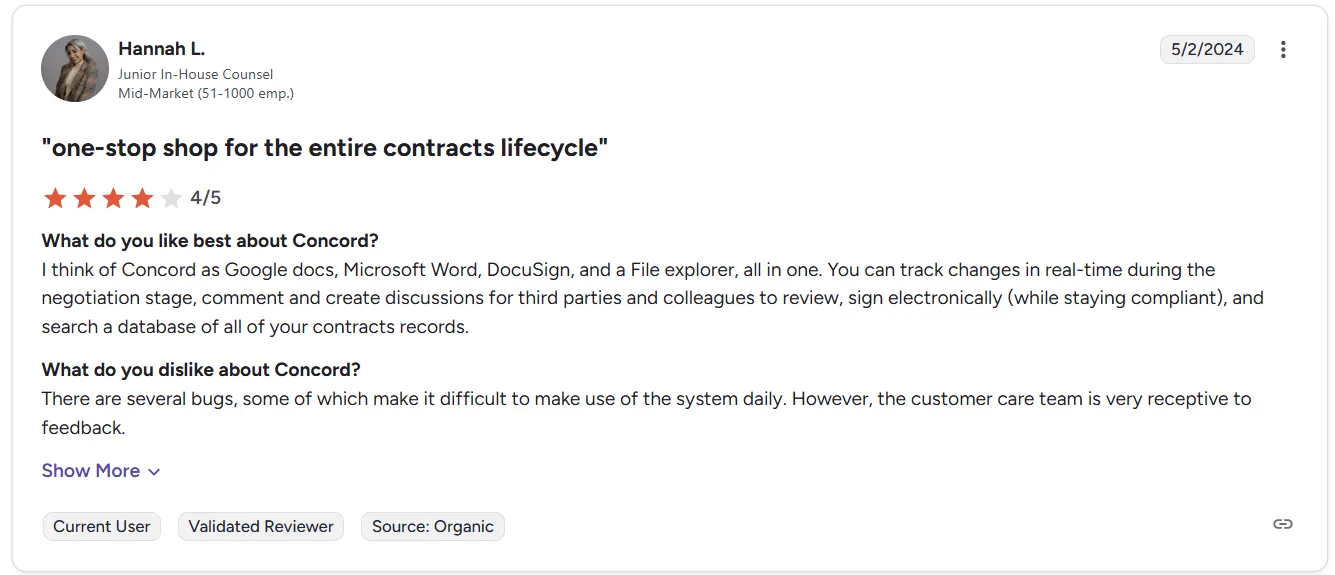
For smaller teams, those gaps may be tolerable. For businesses growing fast or juggling complex contracts, they can become daily roadblocks.
That’s why comparisons like this matter.
In this guide, you’ll learn:
- What’s included in Concord’s pricing, plans, and features
- The limitations and gaps teams often encounter
- How Signeasy compares on flexibility, affordability, and usability
- Which platform delivers better value for growing businesses
How we sourced our data
To make sure this guide is accurate (and useful), we pulled information from multiple places:
- Concord’s official site for pricing, plan details, and feature breakdowns straight from the source.
- Trusted review platforms (Capterra, G2, Software Advice) to see what real users are saying about Concord’s strengths and gaps.
- Industry blogs and comparison sites to double-check consistency and catch any hidden costs or limitations.
What does Concord offer?
Concord is a full contract lifecycle management platform covering drafting, redlining, negotiation, signing, versioning, and tracking, all in one workspace. Its editing experience is marketed as familiar (similar to Google Docs / Word), supporting real-time collaboration, discussion, and version control.
Concord allows “free guests” / external viewers (i.e. you can invite people to view or collaborate) at no extra cost, and its Essentials plan includes unlimited documents and eSignatures, along with unlimited viewers/guests, so basic usage caps are quite liberal.
However, there are limits in terms of number of full users, and advanced features (workflows, clause library, custom permissions etc.) are only available in higher-tier plans.
Concord pricing
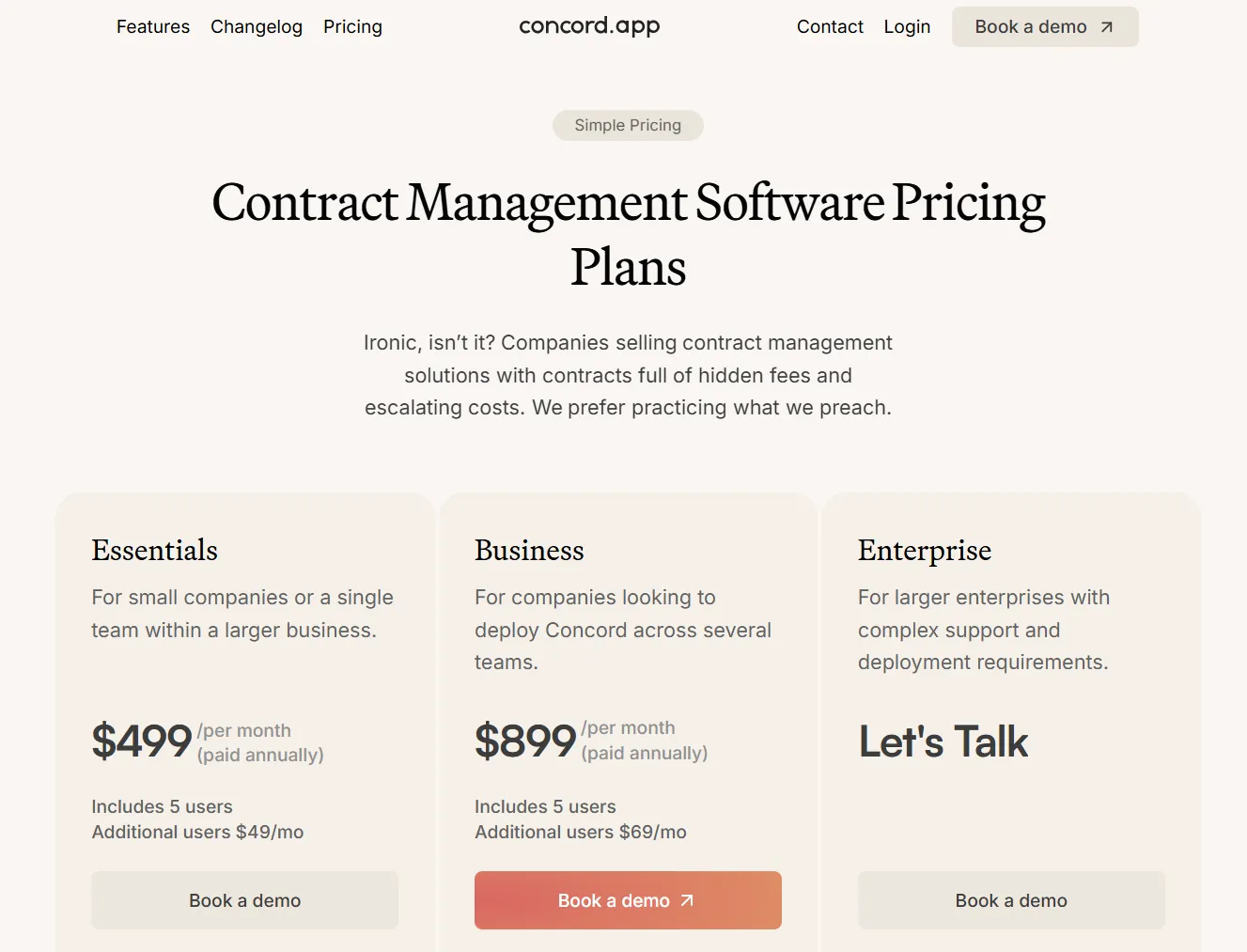

Free trial — what’s the scoop?
You’ll be glad to know Concord offers a no-strings-attached, 14-day free trial. That means you get full access to all the paid features including unlimited drafts and integrations. It’s a thumbs-up from users who appreciate being able to explore without worrying about hidden fees or surprise charges later.
Just a heads-up: Once the trial ends, you’ll need to upgrade to keep using all those features as there’s no free, permanent version.
Hidden costs and fine print
- No free forever option: After your trial ends, there’s no ad-supported or limited-tier plan; you’ll need to subscribe.
- Seat pricing adds up: Extra users can add $39–$54/month each, depending on the plan, so costs can climb fast.
- Feature gates: Some high-upgrade features like bulk send, API access, and branding customizations are only available on the Enterprise plan. Concord does not clearly state whether these Enterprise-only features are included in the free trial.
- Annual-focused pricing: All public pricing is for annual billing. Monthly rates may vary, definitely ask before committing.
Cost per user breakdown
Concord’s pricing looks straightforward at first glance — $499 per month for the Essentials plan and $899 per month for the Business plan. But those prices cover a minimum of five users, not one. That means the Essentials plan comes to about $99.80 per user per month, while the Business plan works out to roughly $179.80 per user per month.
Adding more teammates increases costs further. Each additional user costs $49 per month on Essentials or $69 per month on Business. So, a 10-person team on the Business plan would pay about $1,239 per month — not $899. Over a year, that difference adds up to thousands of dollars.
For startups or small teams, this can feel like paying enterprise rates long before you’re at enterprise scale. That’s why many businesses start comparing tools like Signeasy, which has per-user pricing starting at $10/month on its entry plan, with the Business plan at $15/user/month — both a far lighter lift if you only need a handful of seats.
Annual vs. monthly billing
Concord’s published prices are based on annual billing. That means you’re committing to an annual subscription paid upfront. For some teams, that’s fine. But for small businesses testing out contract management, paying nearly $4,800 to $8,400 upfront can feel like a big leap.
While Concord does advertise monthly billing, the details aren’t always clear. In most cases, you’ll pay a higher per-month rate if you don’t commit annually. This makes Concord a stronger option for businesses ready to go all-in for the long haul, but less attractive for teams that want flexibility or expect their headcount to change frequently.
Refunds and cancellations
Another area to pay attention to: cancellation policies. Concord’s terms state that once you’ve paid, your subscription runs until the end of the billing period. That means if you’ve paid annually and decide to cancel after a few months, you likely won’t get a prorated refund for the unused time. For businesses still experimenting with contract management software, this can feel like a risky commitment.
For teams that prioritize flexibility, this is a limitation worth weighing. If you’re not completely sure Concord is the right fit, you’ll want to make the most of the 14-day free trial before signing a longer contract.
Concord features
Concord is designed to be a full contract lifecycle management (CLM) solution rather than a simple signing tool. It gives teams a single space to draft, negotiate, approve, sign, and track contracts without switching between multiple apps.
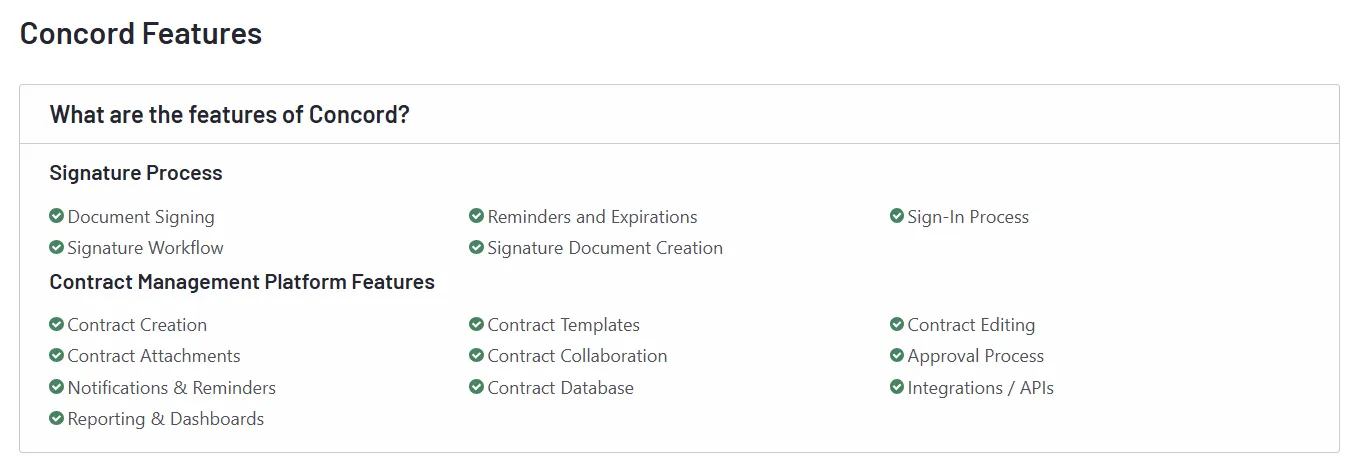
Here’s a breakdown of its features:
Core CLM capabilities
- Unlimited documents, eSignatures, and guest access so you don’t hit usage caps or pay per document
- A Google Docs–style editor that makes drafting, redlining, and commenting familiar for most users
- Collaborative editing / negotiation / comments and versioning, so multiple stakeholders can review and negotiate at the same time
- Amendment management that logs every edit and version in one place for easy auditing
- Deadline reminders and renewal alerts that help avoid missed obligations or expired contracts
- AI Copilot to speed up contract reviews, highlight risks, and suggest improvements
Advanced (Business +)
- Approval workflows that ensure contracts move through the right decision-makers before signature
- Intake forms that let other departments request contracts directly without back-and-forth emails
- Custom roles and team permissions so admins can control who sees or edits contracts
- Reporting and analytics that provide insights into contract activity, cycle times, and team performance
- Integrations with popular tools like Salesforce, HubSpot, Google Drive, Dropbox, Box, and Slack (beta), which help Concord fit into existing tech stacks
Enterprise-only
- Clause library for pre-approved language that reduces drafting time and enforces consistency
- Subsidiary management to support organizations with multiple entities, brands, or departments
- Bulk send to distribute contracts at scale, such as NDAs or policy updates to large groups
- Open API for building deeper integrations with internal systems or custom workflows
- Custom branding that lets enterprises make the platform feel like their own
General platform strengths
- An intuitive interface that feels familiar and reduces training time for new users
- Quick onboarding and implementation, often within days rather than months
- Unlimited guest access so external partners can collaborate without additional fees
- Bank-level security and compliance with ESIGN, UETA, and GDPR to ensure contracts are both safe and legally binding
Concord Support
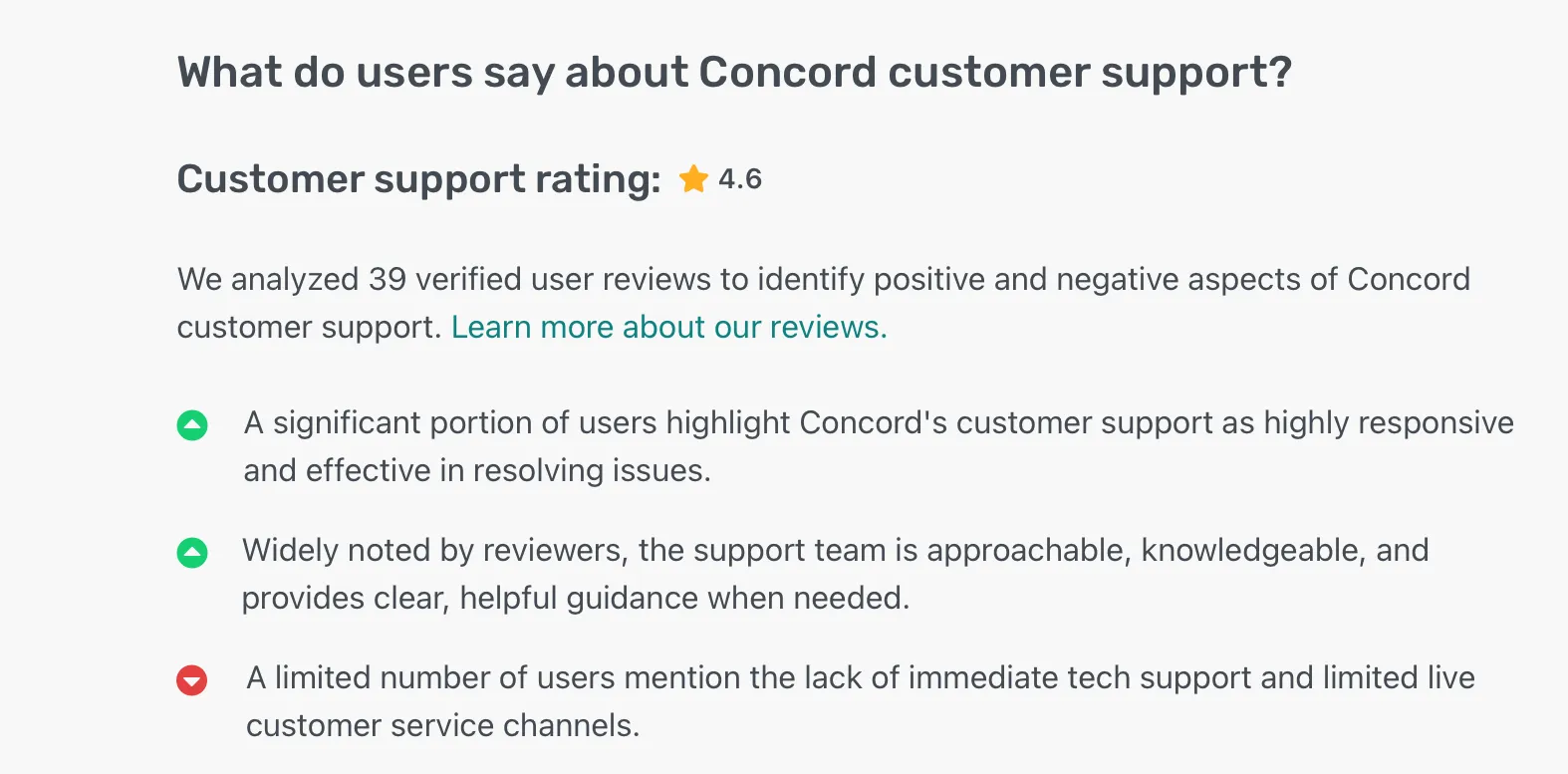
Concord includes customer support across all of its plans, so whether you’re on Essentials, Business, or Enterprise, you’re not left to figure things out on your own.
- Support is included in every plan through email, helpdesk, chat, and other channels.
- Enterprise customers usually get access to a customer success manager who helps with onboarding, adoption, and ongoing optimization.
- Business and Essentials users still report quick responses and helpful guidance, though they may not have the same one-to-one relationship with a success manager.
- Training resources like webinars, documentation, and tutorials are available to all users, making it easier to onboard new team members.
- Some reviews mention occasional feature-related hiccups or bugs, and note that resolving them can require booking support calls rather than getting immediate fixes.
While Concord’s support is generally helpful, it does lean more toward structured assistance rather than instant problem-solving. Smaller teams in particular may find the lack of a real-time support line or slower turnaround for technical issues limiting, especially when compared with platforms that prioritize faster, always-on help.
Concord vs. Signeasy: A detailed comparison
Both Concord and Signeasy are widely used solutions in the digital agreement space, but they serve teams in different ways. To help you evaluate which one aligns better with your business, we’ve broken down the comparison into three key areas: pricing, support, and features.
Looking at these side by side will give you a clear picture of what each platform offers, where they differ, and which one might be the best fit for your team’s needs.
Concord vs. Signeasy pricing comparison
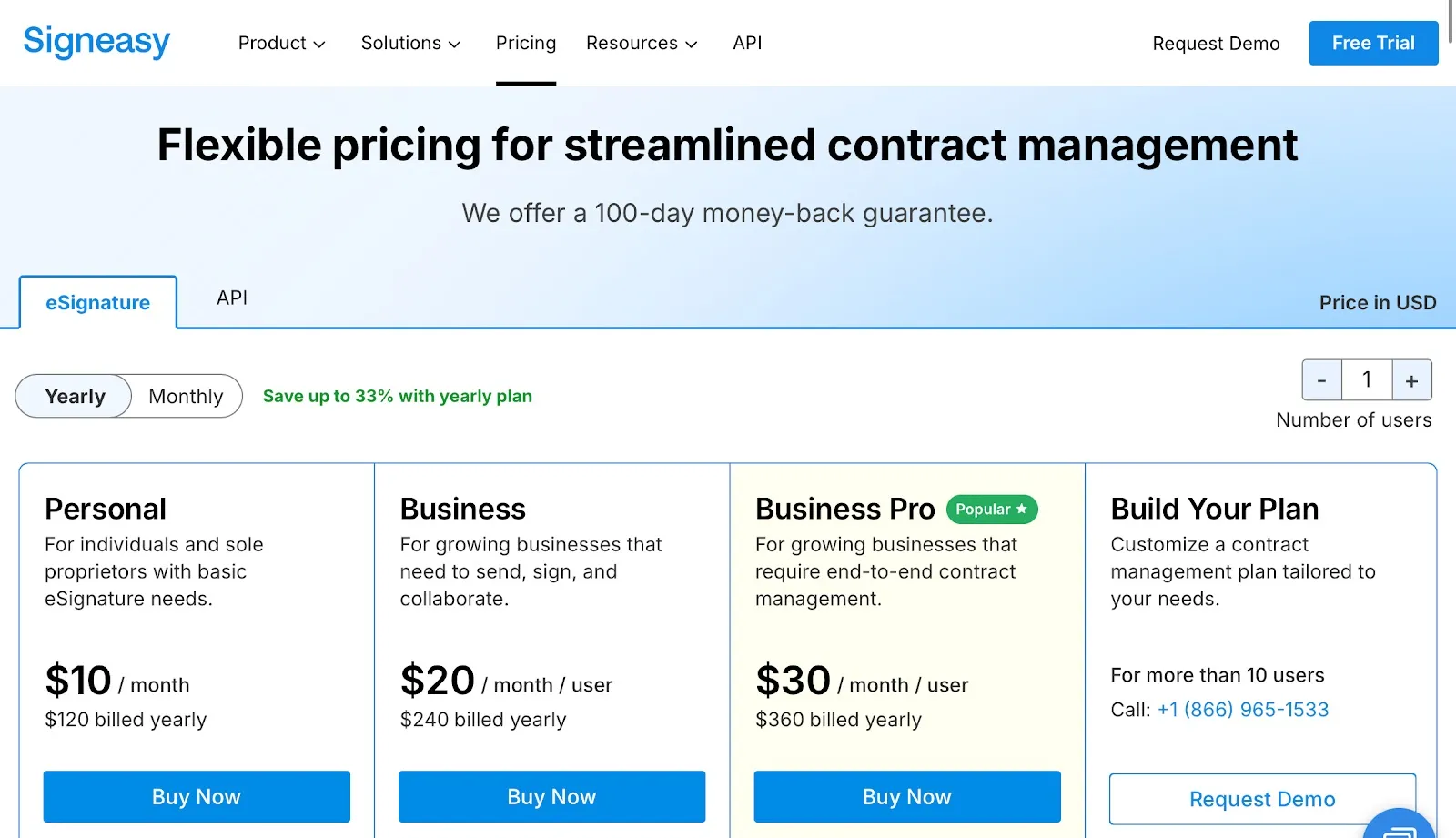
Note on individual use
Signeasy also offers a Personal plan ($10/month per user, billed annually) designed for individuals who need a simple, reliable way to sign and send documents. Here is a comparison of Concord and Signeasy business-facing plans, which prices only at team and enterprise levels.
Concord Essentials vs. Signeasy Business
What this means for you:
- Minimum seat bundle – Concord Essentials requires at least 5 seats, totaling $499/month, while Signeasy Business lets you start with just 1 seat at $20/month.
- Scalable pricing – Signeasy follows a per-user model, so costs rise predictably as your team grows, without bundled seat requirements.
- Advanced functionality included – Signeasy Business adds unlimited templates, AI-powered contract summaries, and team collaboration tools within the base plan.
- Seamless integrations – Signeasy connects with Google Workspace, Slack, Teams, and OneDrive, and provides a centralized admin dashboard for easier oversight.
Concord Business vs. Signeasy Business Pro
What this means for you:
- Pricing model – Concord Business locks in a 5-seat minimum at $699/month, while Signeasy Business Pro runs on transparent per-user pricing at $30/month.
- Scalability – Signeasy lets teams expand seat by seat, keeping costs proportional, whereas Concord adds $54/month for each extra user.
- Advanced controls – Signeasy Business Pro includes role-based access, detailed usage tracking, and advanced 2FA — features typically critical for growing teams.
- Enterprise-ready tools – With HubSpot and SharePoint integrations, priority support, and AI-driven insights, Signeasy delivers enterprise-grade functionality without forcing a custom pricing plan.
Concord Enterprise vs. Signeasy Build Your Plan
What this means for you:
- Custom pricing approach – Both Concord and Signeasy use custom quotes at the enterprise level, but Signeasy structures pricing around flexible, scalable per-seat models.
- Feature depth – Concord Enterprise highlights bulk send, API, and custom branding, while Signeasy Build Your Plan layers in broader enterprise-grade features like detailed audit trails, advanced 2FA, and signer document requests.
- Premium integrations – Signeasy supports SharePoint, HubSpot, and Salesforce integrations directly within its enterprise package, aligning with complex enterprise workflows.
- Support level – Signeasy offers white-glove support in Build Your Plan, emphasizing hands-on assistance for large-scale deployments.
Concord vs. Signeasy support comparison
What this means for you:
Concord users generally find support responsive, especially at the Enterprise level where dedicated success managers are available. However, smaller teams sometimes mention slower resolutions or the need to book calls for technical issues, which can disrupt workflows.
Signeasy takes a more accessible approach, offering 24/7 email support for all users and priority help on higher tiers. For lean teams that can’t afford downtime, that around-the-clock availability can be a deciding factor.
Signeasy vs. Concord features comparison
What this means for you:
Concord shines as a CLM tool built for drafting, negotiating, and managing contracts with features like approval workflows and clause libraries that larger organizations rely on. But for businesses that don’t need full lifecycle management, it may feel like paying for more than you use.
Signeasy keeps the focus on making eSignatures simple and accessible, especially on mobile. Features like offline signing, in-person signatures, and everyday integrations with Gmail, Outlook, and Microsoft Teams make it practical for teams that need flexibility and speed. It may not replace a full CLM, but for many businesses, it covers the essentials better.
Concord or Signeasy: which one should you pick?
When deciding between Concord and Signeasy, the key is matching the tool to your team’s actual needs. Both platforms are strong but they shine in different scenarios.
Why Concord makes sense
Concord is a CLM platform best for organizations that need full oversight of their agreements. It’s built as a full CLM platform and works well when:
- You need to draft, negotiate, and store contracts in one centralized hub.
- Your team requires approval workflows to route agreements through multiple stakeholders before signing.
- You want analytics and reporting to track contract status, renewal dates, and performance.
- Your business relies on enterprise-grade integrations like Salesforce, HubSpot, or Slack to connect contracts with sales and CRM processes.
- You manage complex contract structures (e.g., subsidiaries, multiple brands, or large legal teams) and need features like a clause library or bulk send.
- You’re ready to pay a higher entry price for deep visibility and control over the entire lifecycle of your contracts.
Why Signeasy is often a better fit
Signeasy is built for organizations that want contract workflows to move faster, stay simple, and remain accessible from anywhere.
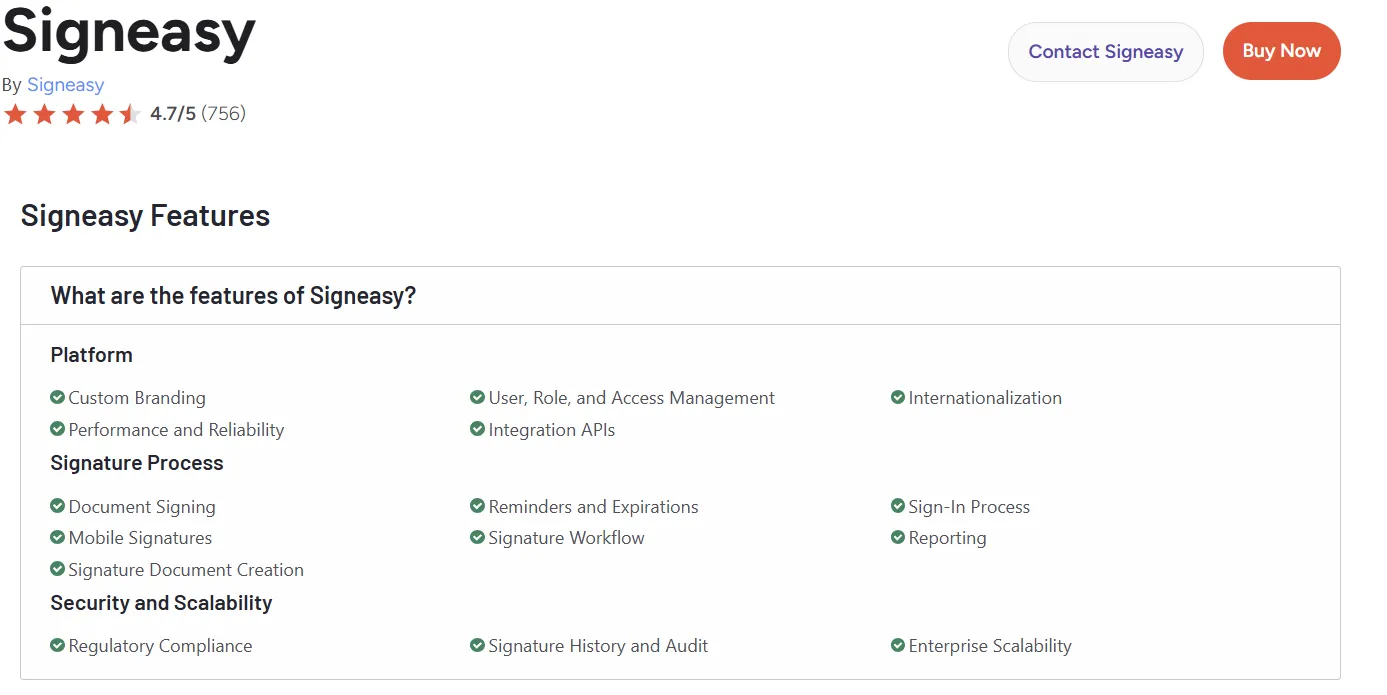
It works best when:
- You mainly need lightweight CLM rather than full contract drafting and lifecycle management.
- You want affordable per-user pricing starting at $10/month with the option for monthly billing (no big upfront lock-ins).
- Your team is often on the go and benefits from mobile-capable design, including iOS and Android apps and offline signing.
- You need features that Concord doesn’t emphasize, such as in-person signing, document envelopes, or signer-requested attachments.
- Security matters, and you prefer biometric login, two-factor authentication, tamper-proof seals, and HIPAA compliance built in.
- You value 24/7 support availability, which helps smaller teams without IT or legal ops get quick answers without waiting for business hours.
The takeaway
- Choose Concord if your business needs end-to-end CLM with heavy workflows, complex approvals, and enterprise-level integrations.
- Choose Signeasy if you want an easy-to-use, budget-friendly eSignature and contract management solution that works anywhere, anytime, and grows with your team.
Signeasy: the smarter alternative to complex CLM tools
Signeasy isn’t trying to be a heavy contract management system and that’s exactly why so many businesses prefer it. Instead of forcing teams to pay for advanced CLM features they may never use, Signeasy focuses on what matters most: fast, secure, and flexible eSignatures.
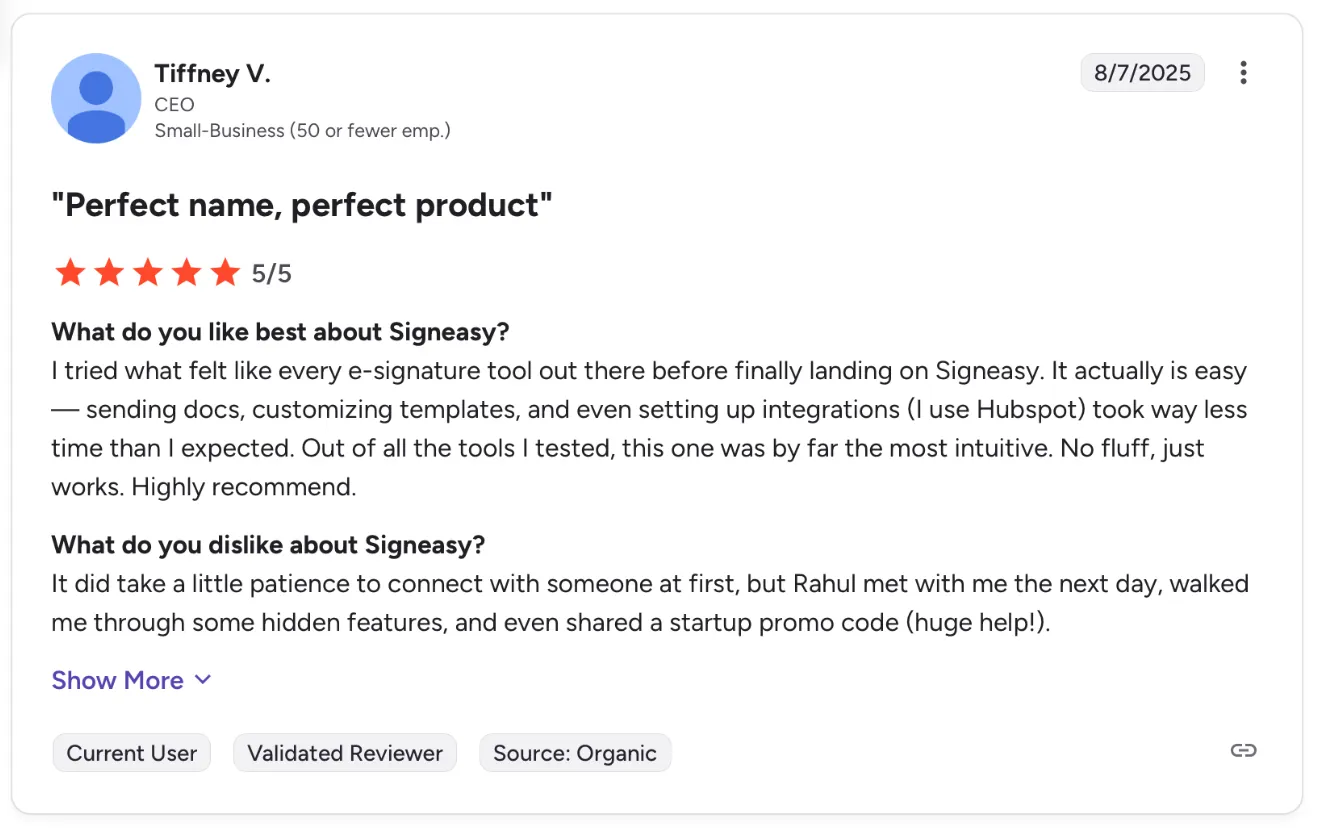
With affordable per-user pricing, and a dedicated app that works even offline, it’s built for teams that need to get contracts signed without friction.
Signeasy delivers the essentials and adds unique advantages that Concord doesn’t offer:
- Mobile-first signing with in-person capture: Signeasy’s iOS and Android apps let you sign and send contracts anywhere, even offline. For teams in the field like sales reps, logistics staff, or retail associates this means no delays waiting to get back to a laptop.
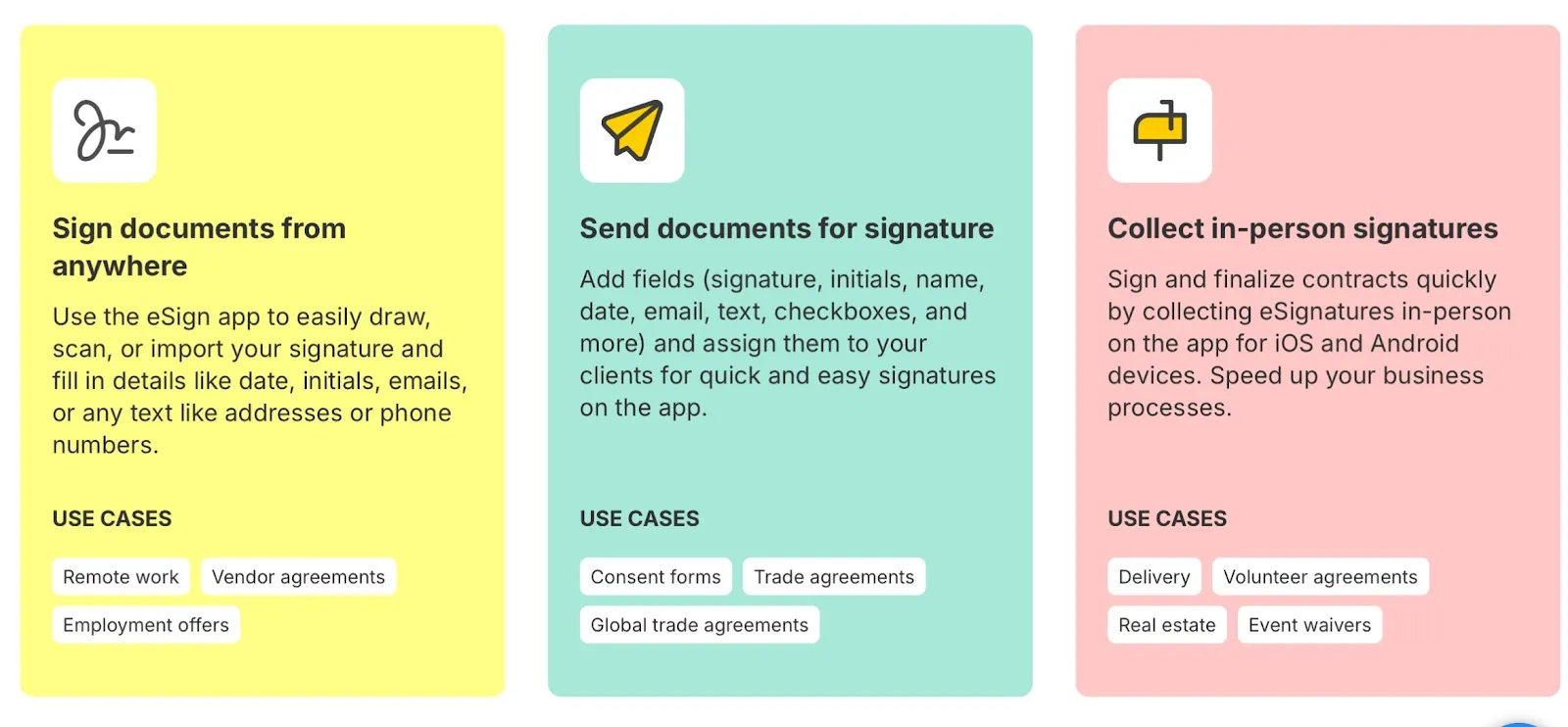
The in-person signing mode even turns a tablet or phone into a kiosk, perfect for on-site agreements.
- Two-factor authentication (2FA): Beyond just sending a signing link, Signeasy lets you add a verification step (like a code sent to the signer’s phone or email).
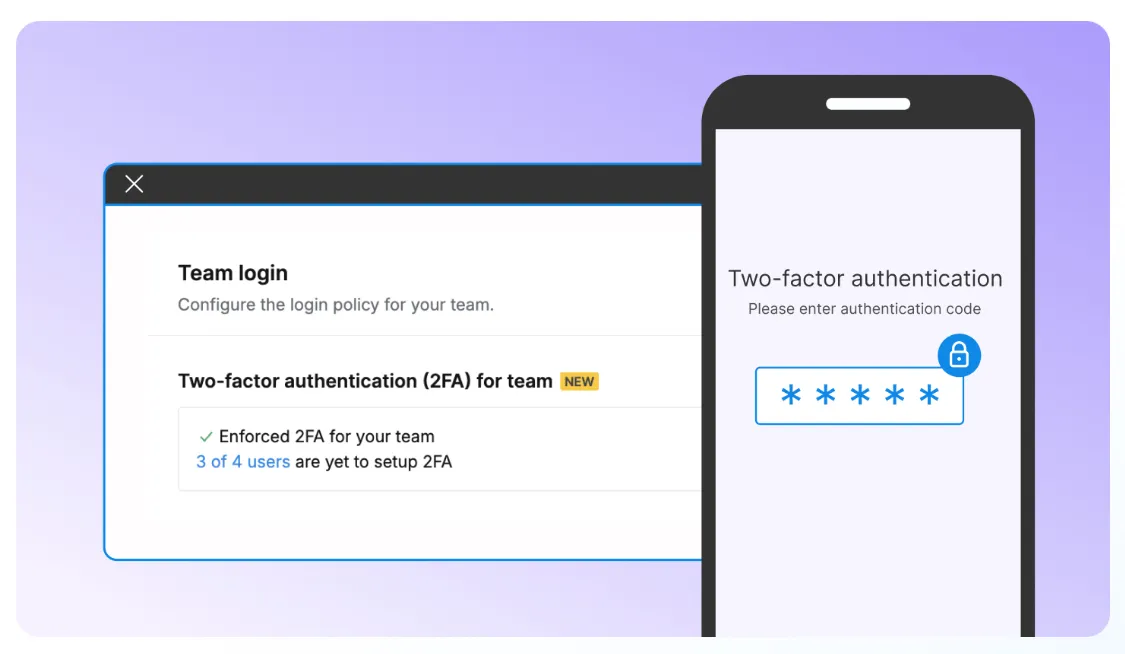
This ensures the person signing is exactly who they claim to be, reducing fraud risks, something Concord doesn’t emphasize.
- Tamper-proof trust seals: Every signed document comes with a digital certificate that shows if it’s been altered.
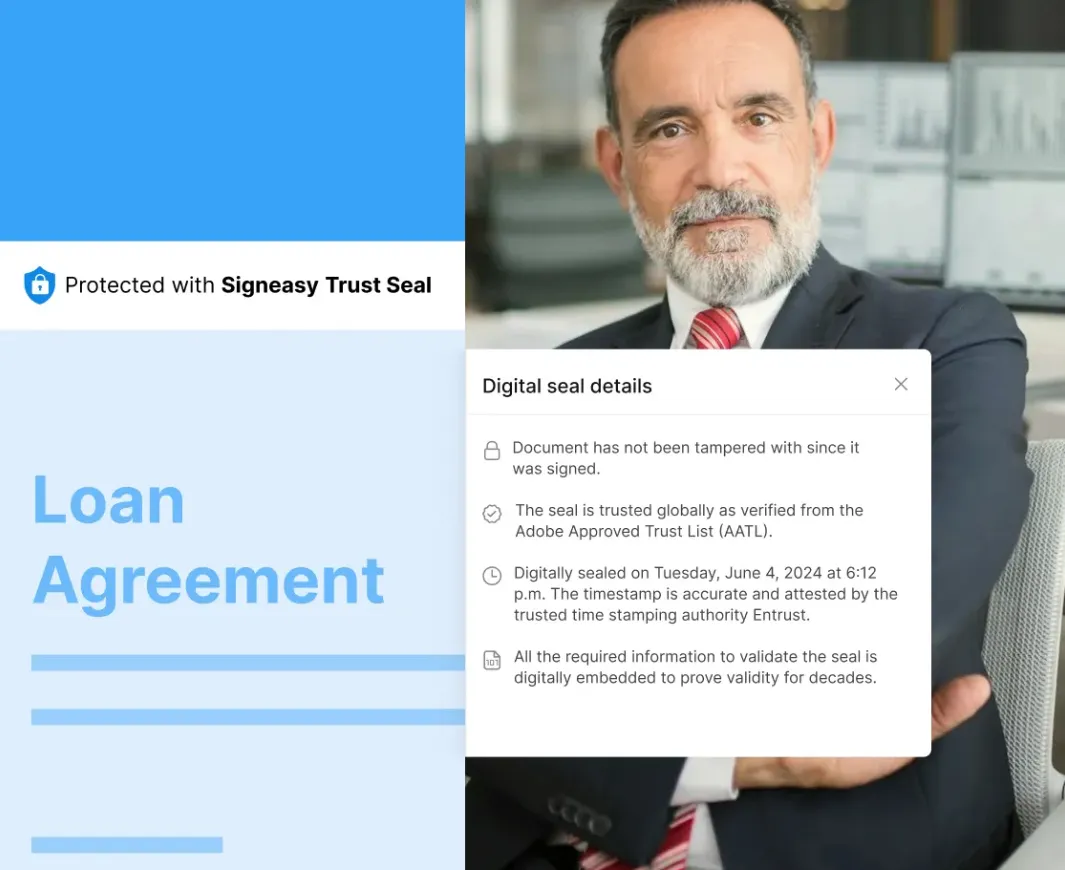
This long-term verification builds confidence with auditors, legal teams, or regulators that the agreement is authentic and untouched.
- Global security and compliance: Signeasy adheres to global standards such as GDPR, SOC 2, 21CFR, and HIPAA, ensuring sensitive data stays secure and legally protected.

This makes them reliable for teams handling confidential agreements, vendor contracts, or employee records.
- Template links and QR codes: Instead of sending contracts one by one, users can generate a template link or QR code.
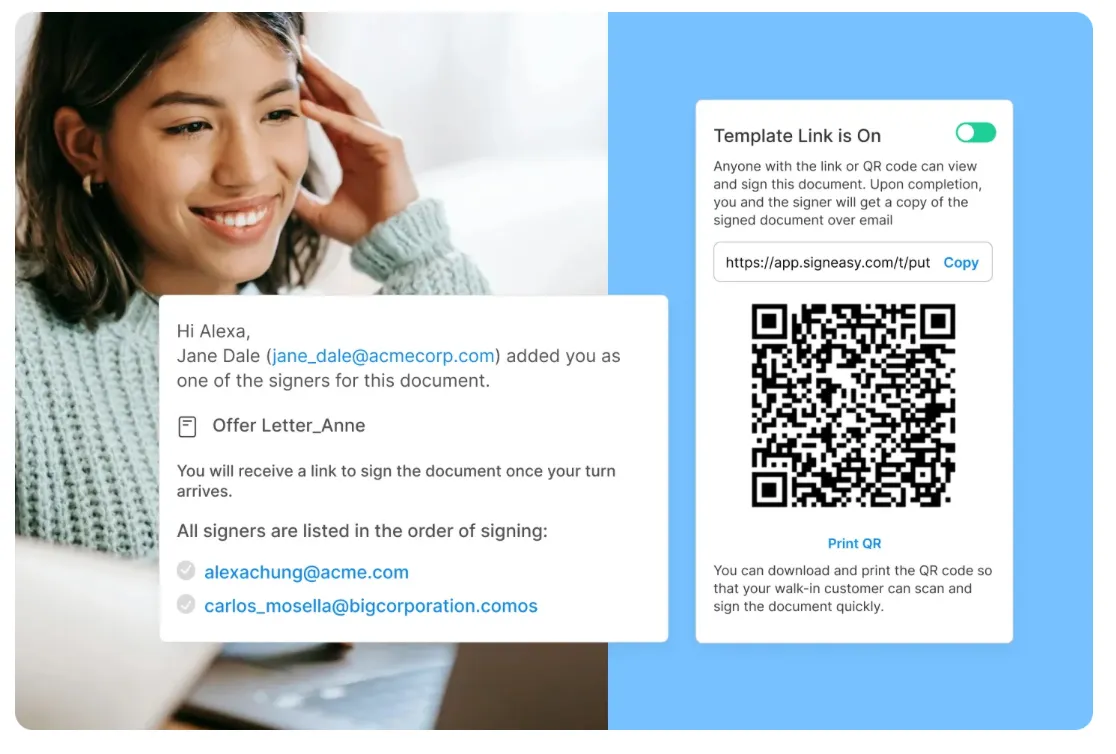
Walk-in customers, event participants, or employees can scan and sign instantly, with both parties getting a copy via email
- 24/7 support availability: Business doesn’t always run 9–5, and Signeasy recognizes that. With round-the-clock email support and priority help for higher tiers, teams know they can get assistance whenever they need it without waiting for business hours.
Ready to see how Signeasy can simplify signing for your team? Start your free 14-day trial today and experience the difference.










